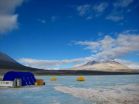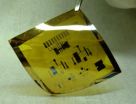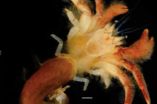(Press-News.org) EAST LANSING, Mich. — Where there's water there's life – even in brine beneath 60 feet of Antarctic ice, in permanent darkness and subzero temperatures.
While Lake Vida, located in the northernmost of the McMurdo Dry Valleys of East Antarctica, will never be a vacation destination, it is home to some newly discovered hearty microbes. In the current issue of the Proceedings of the National Academy of Sciences, Nathaniel Ostrom, Michigan State University zoologist, has co-authored "Microbial Life at -13ºC in the Brine of an Ice-Sealed Antarctic Lake."
Ostrom was part of a team that discovered an ancient thriving colony, which is estimated to have been isolated for more than 2,800 years. They live in a brine of more than 20 percent salinity that has high concentrations of ammonia, nitrogen, sulfur and supersaturated nitrous oxide ¬– the highest ever measured in a natural aquatic environment.
"It's an extreme environment – the thickest lake ice on the planet, and the coldest, most stable cryo-environment on Earth," Ostrom said. "The discovery of this ecosystem gives us insight into other isolated, frozen environments on Earth, but it also gives us a potential model for life on other icy planets that harbor saline deposits and subsurface oceans, such as Jupiter's moon Europa."
On the Earth's surface, water fuels life. Plants use photosynthesis to derive energy. In contrast, at thermal vents at the ocean bottom, out of reach of the sun's rays, chemical energy released by hydrothermal processes supports life.
Life in Lake Vida lacks sunlight and oxygen. Its high concentrations of hydrogen gas, nitrate, nitrite and nitrous oxide likely provide the chemical energy used to support this novel and isolated microbial ecosystem. The high concentrations of hydrogen and nitrous oxide gases are likely derived from chemical reactions with the surrounding iron-rich rocks.
Consequently, it is likely that the chemical reactions between the anoxic brine and rock provide a source of energy to fuel microbial metabolism. These processes provide new insights into how life may have developed on Earth and function on other planetary bodies, Ostrom said.
The research team comprised scientists from the Desert Research Institute (Reno, Nev.), the University of Illinois-Chicago, NASA, the University of Colorado, the Jet Propulsion Laboratory, Montana State University, the University of Georgia, the University of Tasmania and Indiana University.
INFORMATION:
Michigan State University has been working to advance the common good in uncommon ways for more than 150 years. One of the top research universities in the world, MSU focuses its vast resources on creating solutions to some of the world's most pressing challenges, while providing life-changing opportunities to a diverse and inclusive academic community through more than 200 programs of study in 17 degree-granting colleges.
Hearty organisms discovered in bitter-cold Antarctic brine
2012-11-27
ELSE PRESS RELEASES FROM THIS DATE:
Alaska's iconic Columbia Glacier expected to stop retreating in 2020, says CU-Boulder study
2012-11-27
The wild and dramatic cascade of ice into the ocean from Alaska's Columbia Glacier, an iconic glacier featured in the documentary "Chasing Ice" and one of the fastest moving glaciers in the world, will cease around 2020, according to a study by the University of Colorado Boulder.
A computer model predicts the retreat of the Columbia Glacier will stop when the glacier reaches a new stable position -- roughly 15 miles upstream from the stable position it occupied prior to the 1980s. The team, headed by lead author William Colgan of the CU-Boulder headquartered Cooperative ...
Gastric bypass surgery helps diabetes but doesn't cure it
2012-11-27
SEATTLE—After gastric bypass surgery, diabetes goes away for some people—often even before they lose much weight. So does that mean gastric surgery "cures" diabetes? Not necessarily, according to the largest community-based study of long-term diabetes outcomes after bariatric surgery. For most people in the study, e-published in advance of print in Obesity Surgery, diabetes either never remitted after gastric surgery or relapsed within five years.
Among the two thirds of the study's patients whose diabetes at first went away, more than a third re-developed diabetes again ...
To get the best look at a person's face, look just below the eyes, according to UCSB researchers
2012-11-27
They say that the eyes are the windows to the soul. However, to get a real idea of what a person is up to, according to UC Santa Barbara researchers Miguel Eckstein and Matt Peterson, the best place to check is right below the eyes. Their findings are published in the Proceedings of the National Academy of Sciences.
"It's pretty fast, it's effortless –– we're not really aware of what we're doing," said Miguel Eckstein, professor of psychology in the Department of Psychological & Brain Sciences. Using an eye tracker and more than 100 photos of faces and participants, Eckstein ...
Penn researchers make flexible, low-voltage circuits using nanocrystals
2012-11-27
PHILADELPHIA — Electronic circuits are typically integrated in rigid silicon wafers, but flexibility opens up a wide range of applications. In a world where electronics are becoming more pervasive, flexibility is a highly desirable trait, but finding materials with the right mix of performance and manufacturing cost remains a challenge.
Now a team of researchers from the University of Pennsylvania has shown that nanoscale particles, or nanocrystals, of the semiconductor cadmium selenide can be "printed" or "coated" on flexible plastics to form high-performance electronics.
The ...
Did you see that? How could you miss it?
2012-11-27
You may have received CPR training some time ago, but would you remember the proper technique in an emergency? Would you know what to do in the event of an earthquake or a fire? A new UCLA psychology study shows that people often do not recall things they have seen — or at least walked by — hundreds of times.
For the study, 54 people who work in the same building were asked if they knew the location of the fire extinguisher nearest their office. While many of the participants had worked in their offices for years and had passed the bright red extinguishers several times ...
Study advances use of stem cells in personalized medicine
2012-11-27
Johns Hopkins researchers report concrete steps in the use of human stem cells to test how diseased cells respond to drugs. Their success highlights a pathway toward faster, cheaper drug development for some genetic illnesses, as well as the ability to pre-test a therapy's safety and effectiveness on cultured clones of a patient's own cells.
The project, described in an article published November 25 on the website of the journal Nature Biotechnology, began several years ago, when Gabsang Lee, D.V.M., Ph.D., an assistant professor at the Johns Hopkins University School ...
Genome decoded: Scientists find clues to more disease-resistant watermelons
2012-11-27
ITHACA, N.Y. – Are juicier, sweeter, more disease-resistant watermelons on the way? An international consortium of more than 60 scientists from the United States, China, and Europe has published the genome sequence of watermelon (Citrullus lanatus) — information that could dramatically accelerate watermelon breeding toward production of a more nutritious, tastier and more resistant fruit. The watermelon genome sequence was published in the Nov. 25 online version of the journal Nature Genetics.
The researchers discovered that a large portion of disease resistance genes ...
Rapid changes in climate don't slow some lizards
2012-11-27
DURHAM, N.C. -- One tropical lizard's tolerance to cold is stiffer than scientists had suspected.
A new study shows that the Puerto Rican lizard Anolis cristatellus has adapted to the cooler winters of Miami. The results also suggest that this lizard may be able to tolerate temperature variations caused by climate change.
"We are not saying that climate change is not a problem for lizards. It is a major problem. However, these findings indicate that the thermal physiology of tropical lizards is more easily altered than previously proposed," said Duke biologist Manuel ...
Metabolic protein launches sugar feast that nurtures brain tumors
2012-11-27
HOUSTON - Researchers at The University of Texas MD Anderson Cancer Center have tracked down a cancer-promoting protein's pathway into the cell nucleus and discovered how, once there, it fires up a glucose metabolism pathway on which brain tumors thrive.
They also found a vital spot along the protein's journey that can be attacked with a type of drug not yet deployed against glioblastoma multiforme, the most common and lethal form of brain cancer. Published online by Nature Cell Biology, the paper further illuminates the importance of pyruvate kinase M2 (PKM2) in cancer ...
American University biologist discovers new crab species
2012-11-27
Areopaguristes tudgei. That's the name of a new species of hermit crab recently discovered on the barrier reef off the coast of Belize by Christopher Tudge, a biology professor at American University in Washington, D.C.
Tudge has been interested in biology his whole life, from boyhood trips to the beach collecting crustaceans in his native Australia, to his undergraduate and PhD work in zoology and biology at the University of Queensland. He has collected specimens all over the world, from Australia to Europe to North and South America.
Until now, he has never had ...





